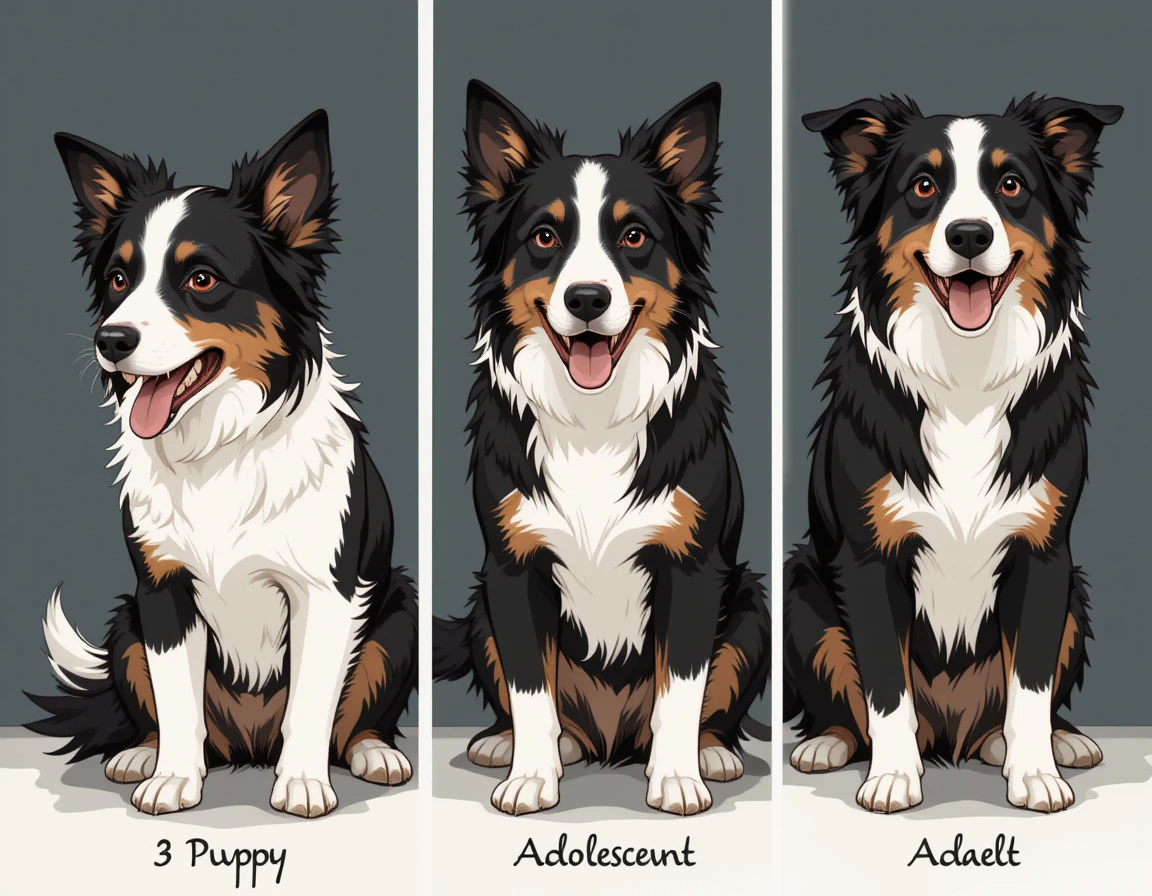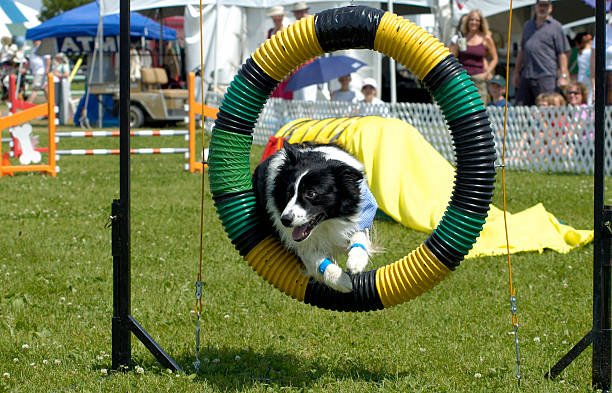
What is a golden Border Collie?
What is a golden Border Collie? What is a golden Border Collie? Last updated Dec. 12, 2024 – Written by Asad Ali Hashmi What is
Last updated Oct. 08, 2024 – Written by M Hasnain Ashraf

Border Collies bark more, but the volume does depend on a myriad of factors such as environment, training, and levels of stimulation. Here is why Border Collies might bark so much and how that can be managed:
Border Collies are naturally alert, very watchful, and responsive to their surroundings. They tend to bark at unusual situations that may pose them a threat or else change things in their environment in one way or another, and this includes unfamiliar people, animals, and noises. Being very sensitive, they do make great watchdogs.
Management:
Train to know what to bark at and when to bark by educating them on the “quiet” command, which may help minimize unnecessary barking. Socialization can also make them feel comfortable about lots of stimuli.
 Why They Bark: Border Collies were bred to drive livestock, often using barking to control the movement of animals. In the home environment, their instinct to move animals may manifest in barking when they feel they need to move or “herd” other animals, children, or adults.
Why They Bark: Border Collies were bred to drive livestock, often using barking to control the movement of animals. In the home environment, their instinct to move animals may manifest in barking when they feel they need to move or “herd” other animals, children, or adults.
Management:
Channeling them into appropriate, acceptable herding activities, such as agility, fetch, or herding trials, can mitigate instinct-related barking.
Why They Bark: Border Collies are incredibly intelligent and energetic. If they are not getting enough physical exercise or mental exercise, they will get bored, and barking then is a way to relieve boredom.
Management:
If you ensure they have enough exercise to keep them active for most of the day, at least 1-2 hours of active play, and provide them with mental stimulation in a puzzle toy or training session, you can avoid boredom barking.
Why They Bark: Border Collies are extremely attached to their owners and may bark for attention if they are either neglected or left alone for too long. Border Collies are a social breed and tend to thrive on activity.
Management:
Consistent engagement, training, and attention along with ignoring “in-effective” barking will help dampen this behavior.
Why They Bark: Some Border Collies become separated from their owners for extended periods. Separation anxiety, barking is a noise that the separated dog makes to show distress or frustration.
Management:
Desensitize to and countercondition being alone. Crate train. Keep the dog occupied with a variety of distractions, such as chew toys, so that the noise and crying that accompany separation anxiety are decreased.
Why They Bark: Border Collies may bark with excitement over playing, a car ride, or just enjoying activities – like fetching or agility.
 Management:
Management:
Anticipatory excitement barking is also minimized by teaching the dogs to remain calm prior to exciting events. Rewards for quiet and practicing impulse control exercises can be useful techniques.
Although Border Collies may bark much more than some breeds due to their intellect, energy, and herding instinct, their excessive barking can usually be controlled through the proper training, exercise, and other mental stimulus. Most Border Collies will learn to bark only when necessary if trained early enough and their needs are met.

What is a golden Border Collie? What is a golden Border Collie? Last updated Dec. 12, 2024 – Written by Asad Ali Hashmi What is

Do all Border Collies have blue eyes? Do all Border Collies have blue eyes? Last updated Dec. 12, 2024 – Written by Asad Ali Hashmi

Are Border Collies pretty dogs? Are Border Collies pretty dogs? Last updated Dec. 11, 2024 – Written by M Hasnain Ashraf Are Border Collies pretty

Why are Border Collies unique? Why are Border Collies unique? Last updated Dec. 11, 2024 – Written by M Hasnain Ashraf Why are Border Collies

Can Border Collies have three colors? Can Border Collies have three colors? Last updated Oct. 10, 2024 – Written by M Hasnain Ashraf Can Border

What is the most difficult age for a Border Collie? What is the most difficult age for a Border Collie? Last updated Oct. 10, 2024

Are Border Collies Aggressive? Are Border Collies Aggressive? Last updated Oct. 10, 2024 – Written by M Hasnain Ashraf Are Border Collies Aggressive? Border Collies

What two breeds make a Border Collie? What two breeds make a Border Collie? Last updated Oct. 10, 2024 – Written by M Hasnain Ashraf

Are Border Collies easy to train? Are Border Collies easy to train? Last updated Oct. 10, 2024 – Written by M Hasnain Ashraf Are Border

Are Border Collie’s colour blind? What is the most Expensive Collie? Last updated Oct. 10, 2024 – Written by M Hasnain Ashraf Are Border Collie’s

What is the most Expensive Collie? What is the most Expensive Collie? Last updated Oct. 10, 2024 – Written by M Hasnain Ashraf What is

What dog has the highest IQ, a Border Collie? What dog has the highest IQ, a Border Collie? Last updated Dec. 23, 2024 – Written

Can Border Collies be black? Can Border Collies be black? Last updated Dec. 23, 2024 – Written by M Hasnain Ashraf Can Border Collies be

What is a rare collie color? What is a rare collie color? Last updated Dec. 23, 2024 – Written by M Hasnain Ashraf What is

Who would win a fight between a German Shepherd and a Border Collie? Who would win a fight between a German Shepherd and a Border

Can Border Collies Live in India? Can Border Collies Live in India? Last updated Dec. 20, 2024 – Written by Asad Ali Hashmi Can Border

Can a Border Collie be a house pet? Can a Border Collie be a house pet? Last updated Dec. 20, 2024 – Written by Asad

Are Border Collies good pets? Are Border Collies good pets? Last updated Oct. 15, 2024 – Written by M Hasnain Ashraf Are Border Collies good

Do Border Collies bark a lot? Do Border Collies bark a lot? Last updated Oct. 15, 2024 – Written by M Hasnain Ashraf Do Border

What is the ideal diet for a Border Collie? What is the ideal diet for a Border Collie? Last updated Oct. 15, 2024 – Written

How intelligent are Border Collies? How intelligent are Border Collies? Last updated Oct. 14, 2024 – Written by Asad Ali Hashmi How intelligent are Border

Are Border Collies good with children? Are Border Collies good with children? Last updated Oct. 14, 2024 – Written by Asad Ali Hashmi Are Border

Do Border Collies shed a lot and Collies live? Do Border Collies shed a lot and Collies live? Last updated Oct. 12, 2024 – Written

Are Border Collies good family pets? Are Border Collies good family pets? Last updated Oct. 11, 2024 – Written by Asad Ali Hashmi Are Border

Why are Border Collies special? Why are Border Collies special? Last updated Oct. 11, 2024 – Written by Asad Ali Hashmi Why are Border Collies

Is a Border Collie the most intelligent dog? Is a Border Collie the most intelligent dog? Last updated Oct. 10, 2024 – Written by M

Is a Border Collie a good family dog? Is a Border Collie a good family dog? Last updated Oct. 10, 2024 – Written by M

What are Collies best known for? What are Collies best known for? Last updated Oct. 09, 2024 – Written by Asad Ali Hashmi What are

Do Border Collies protect you? Do Border Collies protect you? Last updated Oct. 09, 2024 – Written by Asad Ali Hashmi Do Border Collies protect

Do Border Collies tend to bark a lot? Do Border Collies tend to bark a lot? Last updated Oct. 08, 2024 – Written by M

What are the behavioral issues of a Border Collie? What are the behavioral issues of a Border Collie? Last updated Oct. 08, 2024 – Written

Are Border Collies difficult dogs? Are Border Collies difficult dogs? Last updated Oct. 04, 2024 – Written by Asad Ali Hashmi Are Border Collies difficult

How expensive is a Border Collie? How expensive is a Border Collie? Last updated Oct. 04, 2024 – Written by Asad Ali Hashmi Purchase Price

Border Collies vs. Australian Shepherd Border Collies vs. Australian Shepherds: Intelligence, Lifespan, Kid-Friendliness, and More Last updated Sep. 19, 2024 – Written by Asad Ali Hashmi Are

Puppy Border Collie Puppy Border Collie Last updated July. 26, 2024 – Written by Asad Ali Hashmi Introduction & Overview Breeding is a serious responsibility.

Colors Of Border Collie Colors Of Border Collie Last updated July. 26, 2024 – Written by Asad Ali Hashmi Introduction & Overview Border Collies are

Border Collie Watch Dog And Protective Nature Border Collie Watch Dog And Protective Nature Last updated July. 26, 2024 – Written by Asad Ali Hashmi

Border Collie Different Names According To Region Border Collie Different Names According To Region Last updated July. 26, 2024 – Written by Asad Ali Hashmi

Border Collie Grooming Border Collie Grooming Last updated July. 26, 2024 – Written by Asad Ali Hashmi Border Collie Grooming Keeping their coat and skin

Border Collie Exercises Border Collie Exercises Last updated July. 26, 2024 – Written by Asad Ali Hashmi Border Collie Exercises Border Collies are high-energy dogs

Care Requirements Care Requirements Last updated July. 26, 2024 – Written by Asad Ali Hashmi Care Requirements Exercise: They need Regular exercise . Involve them

Border Collies Border Collies Introduction Border Collies are intelligent and easily trainable they are energetic and obedient dogs.Its been about 200 years when border collie